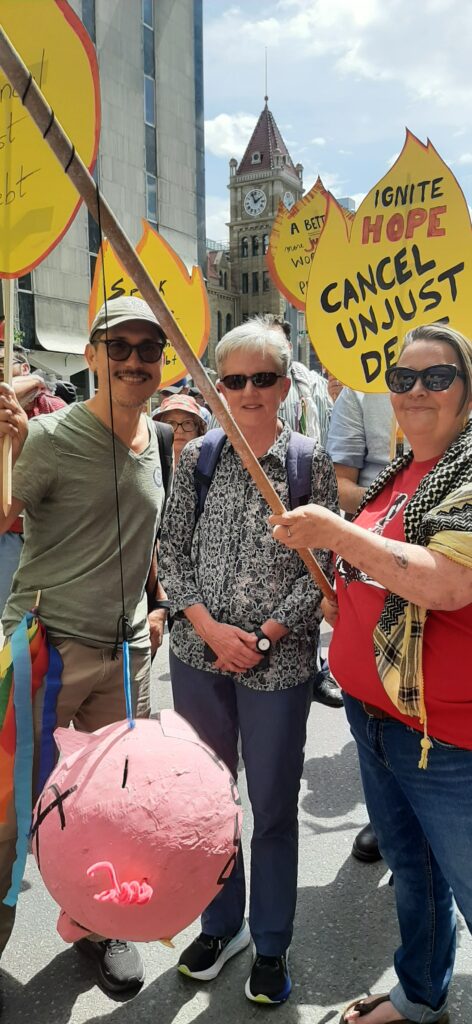
From July 12–15, ORCIE was proud to join voices from across the globe at the G7 Jubilee People’s Forum in Calgary, where Chair of the Board Sue Wilson and Executive Director Genevieve Gallant represented our shared commitment to integral ecology and economic justice.
Held in the days leading up to the G7 Summit in Alberta, the Jubilee Peoples’ Forum in Calgary brought together people from across Canada to explore how debt cancellation, financial system reform, development issues, climate change, and ecological debt are deeply connected—and why, as Sue Wilson reflects, these challenges must be addressed concurrently.
ORCIE, along with KAIROS, Development and Peace – Caritas Canada, Citizens for Public Justice, and the Canadian Council of Churches came together at the Jubilee People’s Forum to deepen our understanding of the interconnectedness of global debt, ecological harm, climate justice, and systemic inequality.
“Who Owes Whom?”: Understanding the Debt Trap
As Development and Peace vice-president Tashia Toupin aptly put it, the issue of debt can feel overwhelming—politically, economically, culturally, and ideologically. Yet the Forum helped to demystify these dynamics, showing how unjust debt, particularly in the Global South, is both a result of and contributor to structural inequality. ORCIE Chair Sue Wilson helped unpack these complex relationships through a lens of integral ecology.
“At the rally, a bystander came up to me and said, ‘Your group is concerned about a lot of issues.’ I looked at the signs the people around me were holding: Turn Debt into Hope. Climate Justice. Reform the Financial System. People before Profit. Who owes whom? Where he saw different issues, I saw the multifaceted and interconnected aspects of the Jubilee Debt Campaign.” — Sue Wilson, CSJ
Sue emphasized how unsustainable debt in the Global South is often driven by:
- Global economic shocks such as the COVID-19 pandemic and war in Ukraine;
- Predatory lending practices by private financial institutions;
- International systems that force countries to prioritize debt repayments over development;
- Lack of global rules on responsible borrowing and lending.
Debt cancellation, then, is not charity. It’s a form of justice—especially when viewed through the lens of ecological debt, the concept that the Global North countries, including Canada, owes a climate and resource debt to the South and Indigenous communities due to centuries of exploitation and emissions.

“This is not charity, but a commitment made in the 2015 Paris Agreement which states that countries must fund global climate actions according to their responsibility for the climate crisis and their ability to pay. Countries like Canada (wealthy, large historic climate polluter, and a key producer of crude oil and gas) must contribute our fair share towards addressing the impacts of climate change in the Global South (Canada’s Fair Share Platform).”
— Sue Wilson, CSJ
Read Sue’s full analysis here: Connecting the Dots: Jubilee People’s Forum and The Debt Cancellation Campaign | Sue Wilson
Let us continue connecting the dots—between faith, finance, and the future—and transforming systems that exploit into systems that heal.

